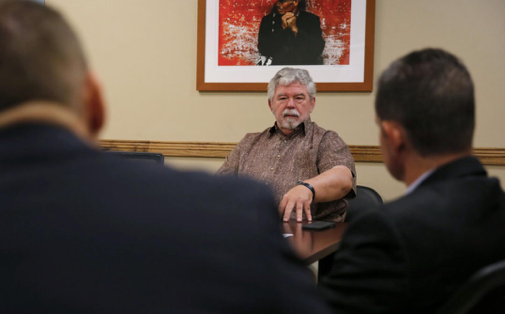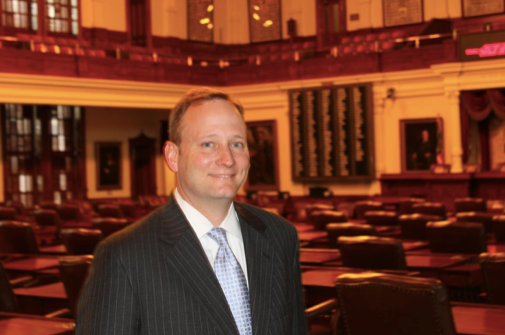Compared to other states, Texas’ mental health systems and services fall towards the middle of the pack—in its “State of Mental Health in America” report (2017), Mental Health America ranked the quality and accessibility of Texas’ mental health care 32nd out of 50 states, a modest improvement from its 34th-place finish in the 2011 survey. Much of this improvement can be attributed to the efforts of community- and system-level activists and officials.
In the midst of a new, contentious political era, one marked by what many perceive as constant gridlock on vital issues, including behavioral health, it is all the more important to recognize and applaud real progress—and the change agents who make it happen. Here are three system-level officials who, in recent years, have spearheaded efforts in their communities and across the state to bring about much-needed mental health reform:
1) Leon Evans, President and CEO, Center for Health Care Services San Antonio

Evans, head of the mental health authority in San Antonio and surrounding Bexar County, has garnered national attention for his work in the community and is frequently visited by community leaders from across the nation to discuss strategies for services and treatment.
Leon Evans has become the subject of national attention since taking the helm of the Center for Health Care Services in 2000. Along with his work on jail diversion programs, he helped to create a Crisis Care Center; The Roberto L. Jimenez MD Restoration Center offering sobering, detox, and substance abuse services; and forged partnerships with local law enforcement, allowing officers to receive crisis intervention training. Since its founding, The Restoration Center has diverted tens of thousands of Bexar County residents into treatment programs, saving taxpayers more than $50 million.
“I can prove treatment works,” Evans said. “I do it through the criminal justice system. We focus our dollars on intervention points, catching these people before they end up in prisons and emergency rooms.” While working for the state, he became “painfully aware of the people going through the criminal justice system with severe mental illness, and that they were really there because they were untreated.”
According to Evans, studies show that behavioral health tops the list when looking at which diseases cost society the most in early death. He continues to advocate for “therapeutic justice” for people with severe mental illness. Evans is currently spearheading a project to establish a primary care clinic, as well as improvements to Prospects Courtyard, a safe sleeping area for homeless residents who are struggling with mental health and substance use challenges.
2) State Rep. Four Price, Amarillo

Price has long been considered a champion of mental health in the Texas House of Representatives.
Four Price has long been considered the Texas House’s resident mental health champion. Last month he filed HB 10, which, if passed, will strengthen state mental health parity laws, initiate a strategy to modernize the state’s lagging mental health system, and designate an ombudsman to oversee access to behavioral health care.
The House Select Committee on Mental Health, which Price chairs, spent months hearing testimony about the illusion of parity and other mental health issues plaguing the state.
The committee, put together by House Speaker Joe Straus, concluded that access to service, early intervention and assessment, and workforce challenges are some areas that need “immediate and ongoing attention; but, improvement in these areas is absolutely achievable.”
And both the House and Senate want to put some serious money into reforming the system. The Senate is debating investing $95 million to address mental healthcare, while the House has proposed appropriating an additional $162 million, which would be implemented as seen fit by Price’s Mental Health Committee.
The Public Health Committee, also chaired by Price, is also considering HB 11, which would address mental health education in primary and secondary schools, requiring school districts to provide mental health resource information in student handbooks, a class on mental health and substance use issues and educator tools for counseling students suffering from emotional turmoil.
3) Eric Samuels, President and CEO, Texas Homeless Network

Head of the Texas Homeless Network, Samuels (left), along with other advocates, helped facilitate a 42% decrease in Texas homelessness, allowing the state to become a national leader on the issue.
Advocates for Texas’ homeless population have seen encouraging progress as of late. A November 2016 report by the U.S. Department of Housing and Urban Development revealed that the state had reduced the number of homeless individuals by 42 percent between 2007 and 2016. Only four other states saw larger drops.
Eric Samuels has led the Texas Homeless Network (THN) since 2015. THN provides training and assistance to help local government agencies tackle homelessness, along with coordinating local and national advocacy efforts.
“It’s either permanent support housing or rapid re-housing. They’re not moving people through emergency shelter and transitional housing programs,” Samuels said. “Because they’re directing funding towards those programs, we’re getting people out of homelessness faster.”
While Texas’ low homeless rate can largely be attributed to low housing costs and a relatively stable economy, many of the improvements stem from expanded programs and increased funding. Most of that funding came from the federal government, which has increased its investment in Texas homelessness prevention and resources by 70 percent since 2005. These systematic improvements came only after years of outcry by numerous advocacy organizations, including the Texas Homeless Network.
“Throughout my career I’ve met many people who are experiencing homelessness,” Samuels said. “These people are as varied as any other people I’ve met in my life, but as a whole they’ve taught me what it is to be resilient, brave, and caring. The other group that drives my passion are those that work so hard to alleviate homelessness within their communities. Their passion is contagious and I feel an overwhelming need to work as hard as I can every day to make their lives a little easier, and their efforts more fruitful.”

